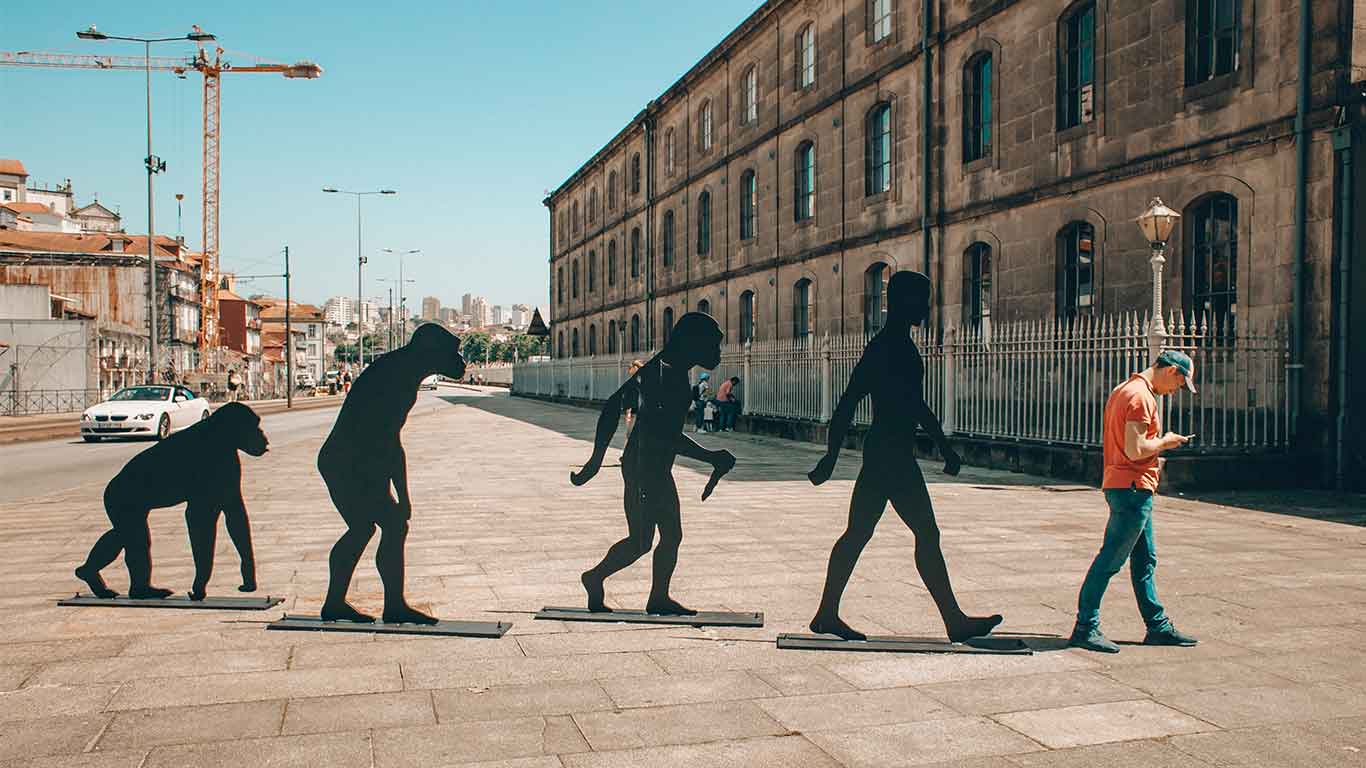
Where did we come from?
HOW STORIES SHAPE OUR IDENTITY
12
November, 2021
A Series on Sex, Gender, and the Bible
Origins and Human Identity
Does it really matter “how” we identify ourselves? How you answer this question says a lot about how you view the story of our world.
In this series on “Sex, Gender, and the Bible” I’m exploring the question “what does the Bible say, if anything, about what it means to be human?”
Every generation asks the same set of questions:
Why am I here?
Where did we come from?
What is the meaning of life?
These questions go to the heart of what it means to be human and relate directly to how we see ourselves and the world. Yet, despite our common experiences as a single species, not everyone answers these questions the same way.
Which Identity fits?
Usually, identity is given to us before we’re ever born. Then we spend the early part of our adolescents and adulthood trying to figure out what we’re not. We do this by “trying out” identities to see which one works. Then, we look at the world and see how it works for others. We even build our faith identity on the foundation of how we feel, i.e. race, sexuality, gender, vocation, or caste.
But what if we started the other way around? What if instead of starting with an existing identity, say a cisgender white heterosexual male (which I suppose is one way to describe me), we start by exploring how the God of the Bible identifies human beings? Maybe then we can come to a deeper understanding of the importance of self-identity.
I suggested in Part 1 of the series that to read the Bible, we needed to learn to read it weirdly. By weird, I do not mean silly or foolish, or inane. But rather to see it presenting a standard that’s frankly so different from ordinary life that it causes us to pause for a moment to think about what it is trying to tell us.
Because if the Bible does have something to say about how human beings should self-identify, then we should at least stop and consider what the God of the Bible has to say about the essence of being human.
So to help frame this conversation, I”ll start with the question, “So where did we come from?”
To answer this question, I’m going to turn to the very first page of our motel Bible to explore what it has to say about how the world began.

Photo courtesy of Unsplash.com
intentionally designed with purpose
On the first page of every Bible, yes, even the ones in hotel and motel rooms, are these words:
“In the beginning, God created the heavens and the earth.” (Genesis 1:1, CSB)
Then roughly 521 words later, depending on the English version you are reading, are the following words.
“Then God said, “Let us make man in our image, according to our likeness. They will rule the fish of the sea, the birds of the sky, the livestock, the whole earth, and the creatures that crawl on the earth.” So God created man in his own image; he created him in the image of God; he created them male and female. God blessed them, and God said to them, “Be fruitful, multiply, fill the earth, and subdue it. Rule the fish of the sea, the birds of the sky, and every creature that crawls on the earth.” (Genesis 1:26–28, CSB)
If you read the whole story on page one, you’ll discover that the God of the Bible created the entire universe in six days. Human beings were the climax, the very last of His creation, and were intended to represent the God who made it all.
In particular, the story says the God of the Bible designed human beings presumably as a complementary set, male and female, to reflect the divine image, God’s very likeness. Their purpose was to rule over all that had been created, be fruitful and multiply, and fill the earth. That’s a pretty straightforward reading.
Here in the short little paragraph, we find the origins of gender, the meaning or purpose of life, and a positive statement on sex. While some theologians like to argue that the phrase “fruitful and multiply” implies a “cultural mandate.” It’s hard to imagine a human culture without a lot of sex going on. To have culture, you need people. And to have people, well, at some point sex is probably going to be involved.
So far what we can say is the following: According to the Bible, human beings were intentionally created by God with a purpose.

Unintentional Evolution
Now in our modern scientific understanding of the origins of the world, the Genesis story sounds like a real stretch of reasoning. And if you came to that conclusion, then who would blame you?
Most of our high school biology teachers taught us a different story. Here’s the gist of what we’ve been taught.
In the 19th Century, Charles Darwin introduced an entirely new story in his little book “The Origins of the Species.” In it he chronicles his adventures on the Galapogos Islands staring at tortoises, birds, and lizards. From his time spent on the islands, he developed a theory of how life came to be in its current state. Instead of human beings beginning with a divine purpose, homosapiens (the scientific classification for human beings) evolved from a natural (meaning no divine intent) process.
Darwin, followed by many scientist influenced by his writings, proposed human beings descended from ape-like creatures, who descended from some lesser sort of primate, who ultimately descended from some really ancient creature that a hundred million years ago (give or take a billion more) evolved from a bacteria or something like it. And then somehow, under some impulse which is never explained, our primordial ancestor slithered or crawled out of an ancient salt bath.
I suppose our ancestor enjoyed the sunshine as I do and decided to stick around long enough to evolve into the guy writing this series.
The nice and tidy thing about Darwin’s story is its moral neutrality. If our origins were mere chance happenings related to natural forces, then we are free and able to define ourselves any way we want.
That is the story we’ve all been given and the operating belief of our culture. And consequently, when we read Genesis, it all sounds like a stretch.
The very idea Genesis proposes that a god could have created the universe in six days is just silly.
And if I have to choose between believing in evolution or buying into Genesis, I’ll choose to side with science.
But consider what is really being proposed? Life descended from a mathematical improbability that just sort of happened, at least in this version of the universe we find ourselves. We’re here and just need to make the best of it for 5o to 70 years and that’s about it.
Yet, there is a decision between these two stories we must choose to believe. In the Genesis account, human beings appear to have been created for a purpose, formed into a binary pair and told to populate our planet.
In the Darwin account, no purpose is apparent. Male and female sexuality may be more evolutionary necessity for “survival of the fittest” rather than any divine intent. And given the world’s current population challenges, we no longer need to worry about survival. Even more, who or what an individual chooses to have sex with, really shouldn’t concern anyone. It’s all a matter of preference, choice, and orientation.
To quote the philosophers, “if there is no god, then all things are permissible.”
Meaning and purpose appear to be nothing more than a vain attempt to justify our primordial bacteria existence, perhaps a product of “the survival of the species” instinct. So be nice to the muck ponds in your neighborhood, perhaps a future race of philosophic creatures exists there. Or not. It doesn’t really matter.
As you can see from the two options above, sex, gender, and purpose go hand in hand. They are not neutral issues but deeply tied to the question, “what is the essence of being human?”
How you arrive at an answer will significantly determine how you interpret yourself and the world around you. Are you here intentionally or by mere chance?
So what is the essence of being human?
We are essentially sacerdotales homo partum, a priestly creative being.
IDENTITY WITH PURPOSE
According to the first page of the Bible, Human beings were originally intended to serve as God’s image-bearers and not god manufacturers. And that’s the weird part of Genesis. Theologians call our image-bearing nature The Imago Dei, a Latin phrase meaning “image of God.”
Along with our Imago Dei is a purpose. Be fruitful and multiply. To put it bluntly, the first humans were instructed to have sex and fill the earth.
It seems that God’s original intent of sex was to fill the earth with living statues or image-bearers. Rather than lifeless idols proclaiming the deity of the land, human beings were to serve in this role.
We can see this clearly in the first line where it says, “And God said let us make man in our image, according to our likeness (Gen. 1:26 CSB). Unlike the rest of the creatures, the God of the Bible created, human beings resembled God’s very likeness.
Human beings were to represent God to the rest of creation, to rule over it. They weren’t to rule as tyrants, exploiting its resources for personal gain but instead as priests, the intermediaries between God and the creation. Like the statues of old, human beings represented the very rule of a sovereign divine creator who laid claim to the whole world.

How Do We Bear God’s Image?
We’re not really sure how exactly we bear God’s image. All we know is the original purpose was to be image-bearers. Since Genesis also teaches that God is spirit, how human beings reflect God’s Spirit is left unanswered.
Yet from the very first page of our motel Bibles, we can inevitably conclude that part of image-bearing involves creativity. Returning to my comment above on a cultural mandate, one of the significant aspects of humanity is its creative expression.
No other species build buildings, stadiums, temples, or cathedrals. No other species paints writes or sculpts. It seems at the very least that creativity from a Genesis point of view is inherent to The Imago Dei.
So what is the essence of being human according to Genesis 1? We are essentially sacerdotales homo partum, a priestly creative being.
What does this mean for how we identify ourselves? From our motel Bibles, we can preliminary conclude that human identity is fused with divine intent. And cannot be separated.
There is good news here. When we consider human identity, we can base it on something more significant than gender, biology, or sexuality alone. In other words, to the degree that we express The Imago Dei, we can discover a deep connection with who we really are in whatever capacity that may be.
QuestionS:
What do you base your identity?
Have you ever considered yourself a divine image-bearer?
When you stop and consider the two origins of humanity, which one appeals to your sense of purpose, identity, and meaning?
How does viewing yourself as a priestly creative being change the way you view human beings?




